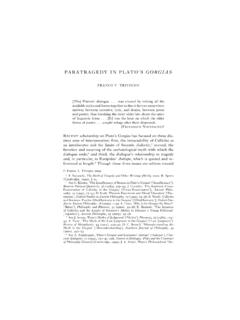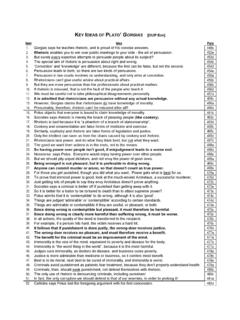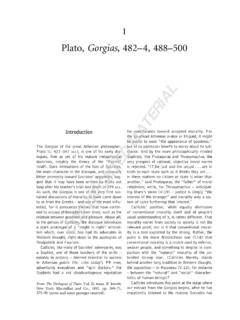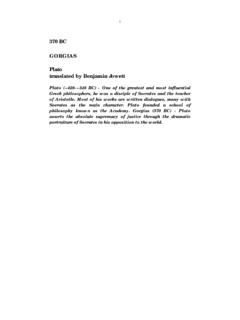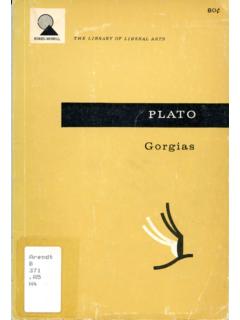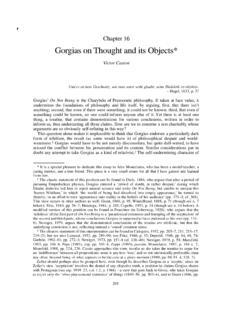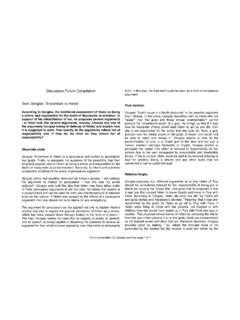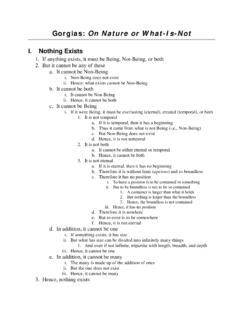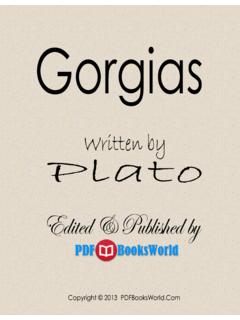Transcription of Gorgias--About the Dialogue - RhetInfo
1 PDF generated using the open source mwlib toolkit. See for more generated at: Sun, 11 Nov 2012 18:42:53 UTCG orgias-- about the DialogueEdited by Steven WeissContentsArticlesGorgias1 Socrates7 Polus20 Chaerephon20 Callicles22 Socratic dialogue22 gorgias ( Dialogue )24 ReferencesArticle Sources and Contributors30 Image Sources, Licenses and Contributors32 Article LicensesLicense33 Gorgias1 GorgiasGorgias ( )Born485 BCLeontiniDied380 BCEraPre-Socratic philosophyRegionWestern PhilosophySchoolSophismMain interestsontology, Epistemology rhetoric, moral relativismNotable ideasRhetorical 'Paradoxologia' gorgias / rd i s/ (Greek: , Ancient Greek: [ or as]; "the Nihilist"; c. 485 c. 380 BC),[1] Greeksophist, pre-socratic philosopher and rhetorician, was a native of Leontini in Sicily.
2 Along with Protagoras, he formsthe first generation of Sophists. Several doxographers report that he was a pupil of Empedocles, although he wouldonly have been a few years younger. "Like other Sophists he was an itinerant, practicing in various cities and givingpublic exhibitions of his skill at the great pan-Hellenic centers of Olympia and Delphi, and charged fees for hisinstruction and performances. A special feature of his displays was to invite miscellaneous questions from theaudience and give impromptu replies."[2]His chief claim to recognition resides in the fact that he transplanted rhetoric from his native Sicily to Attica, andcontributed to the diffusion of the Attic dialect as the language of literary originated from Leontini, a Greek colony in Sicily, and what is often called the home of Spartan rhetoric.
3 Itis known that gorgias had a father named Charmander and two siblings a brother named Herodicus and a sisterwho dedicated a statue to gorgias in Delphi (McComiskey 6-7).He was already about sixty when in 427 he was sent to Athens by his fellow-citizens at the head of an embassy toask for Athenian protection against the aggression of the Syracusans. He subsequently settled in Athens, probablydue to the enormous popularity of his style of oratory and the profits made from his performances and rhetoricclasses. According to Aristotle, his students included Isocrates.[3] (Other students are named in later traditions; theSuda adds Pericles, Polus, and Alcidamas,[4] Diogenes La rtius mentions Antisthenes,[5] and according toPhilostratus, "I understand that he attracted the attention of the most admired men, Critias and Alcibiades who wereyoung, and Thucydides and Pericles who were already old.)
4 Agathon too, the tragic poet, whom Comedy regards aswise and eloquent, often Gorgianizes in his iambic verse").[6] gorgias is reputed to have lived to be one hundred and eight years old (Matsen, Rollinson and Sousa, 33). He wonadmiration for his ability to speak on any subject (Matsen, Rollinson and Sousa, 33). He accumulated considerablewealth; enough to commission a gold statue of himself for a public temple.[7] After his Pythian Oration, the Greeksinstalled a solid gold statue of him in the temple of Apollo at Delphi (Matsen, Rollinson and Sousa, 33). He died atLarissa in innovationGorgias ushered in rhetorical innovations involving structure and ornamentation and the introduction ofparadoxologia the idea of paradoxical thought and paradoxical expression.
5 For these advancements, gorgias hasbeen labeled the father of sophistry (Wardy 6). gorgias is also known for contributing to the diffusion of the Atticdialect as the language of literary prose. gorgias was the first orator to develop and teach a "distinctive style ofspeaking," (Matsen, Rollinson and Sousa, 33). gorgias extant rhetorical works (Encomium of Helen, Defense of Palamedes, On Non-Existence, and Epitaphios)come to us via a work entitled Technai, a manual of rhetorical instruction, which may have consisted of models to bememorized and demonstrate various principles of rhetorical practice (Leitch, et al. 29). Although some scholarsclaim that each work presents opposing statements, the four texts can be read as interrelated contributions to theup-and-coming theory and art (techn ) of rhetoric (McComiskey 32).
6 Of gorgias surviving works, only theEncomium and the Defense are believed to exist in their entirety. Meanwhile, there are his own speeches, rhetorical,political, or other. A number of these are referred to and quoted by Aristotle, including a speech on Hellenic unity, afuneral oration for Athenians fallen in war, and a brief quotation from an Encomium on the Eleans. Apart from thespeeches, there are paraphrases of the treatise "On Nature or the Non-Existent." These works are each part of theDiels-Kranz collection, and although academics consider this source reliable, many of the works included arefragmentary and corrupt. Questions have also been raised as to the authenticity and accuracy of the texts attributed toGorgias (Consigny 4).
7 gorgias writings are both rhetorical and performative. He goes to great lengths to exhibit his ability of making anabsurd, argumentative position appear stronger. Consequently, each of his works defend positions that are unpopular,paradoxical and even absurd. The performative nature of gorgias writings is exemplified by the way that heplayfully approaches each argument with stylistic devices such as parody, artificial figuration and theatricality(Consigny 149). gorgias style of argumentation can be described as poetics-minus-the-meter (poi sis-minus-meter). gorgias argues that persuasive words have power (dunamis) that is equivalent to that of the gods and as strong asphysical force. In the Encomium, gorgias likens the effect of speech on the soul to the effect of drugs on the body: Just as different drugs draw forth different humors from the body some putting a stop to disease, others to life so too with words: some cause pain, others joy, some strike fear, some stir the audience to boldness, some benumband bewitch the soul with evil persuasion ( gorgias 32).
8 gorgias also believed that his "magical incantations" would bring healing to the human psyche by controllingpowerful emotions. He paid particular attention to the sounds of words, which, like poetry, could captivateaudiences. His florid, rhyming style seemed to hypnotize his audiences (Herrick 42). gorgias ' legendary powers ofpersuasion would suggest that he had a somewhat preternatural influence over his audience and their other Sophists, such as Protagoras, gorgias did not profess to teach arete (excellence, or, virtue). He believedthat there was no absolute form of arete, but that it was relative to each situation (for example, virtue in a slave wasnot virtue in a statesman) His thought was that rhetoric, the art of persuasion, was the king of all sciences, since itwas capable of persuading any course of action.
9 While rhetoric existed in the curriculum of every Sophist, Gorgiasplaced more prominence upon it than any of the debate over both the nature and value of rhetoric begins with gorgias . Plato s Dialogue entitled Gorgiaspresents a counter-argument to gorgias embrace of rhetoric, its elegant form, and performative nature (Wardy 2).The dialog attempts to show that rhetoric does not meet the requirements to actually be considered a techn but is asomewhat dangerous "knack" to possess both for the orator and for his audience. This is because it gives the ignorantthe power to seem more knowledgeable than an expert to a the Non-ExistentGorgias is the author of a lost work: On Nature or the Non-Existent. Rather than being one of his rhetorical works, itpresented a theory of being that at the same time refuted and parodied the Eleatic thesis.
10 The original text was lostand today there remain just two paraphrases of it. The first is preserved by the philosopher Sextus Empiricus inAgainst the Professors and the other by the anonymous author of On Melissus, Xenophanes, and gorgias . Eachwork, however, excludes material that is discussed in the other, which suggests that each version may representintermediary sources (Consigny 4). It is clear, however, that the work developed a skeptical argument, which hasbeen extracted from the sources and translated as exists; if something exists, nothing can be known about it; if something can be known about it, knowledge about it can't be communicated to if it can be communicated, it cannot be argument has largely been seen as an ironic refutation of Parmenides' thesis on Being.


